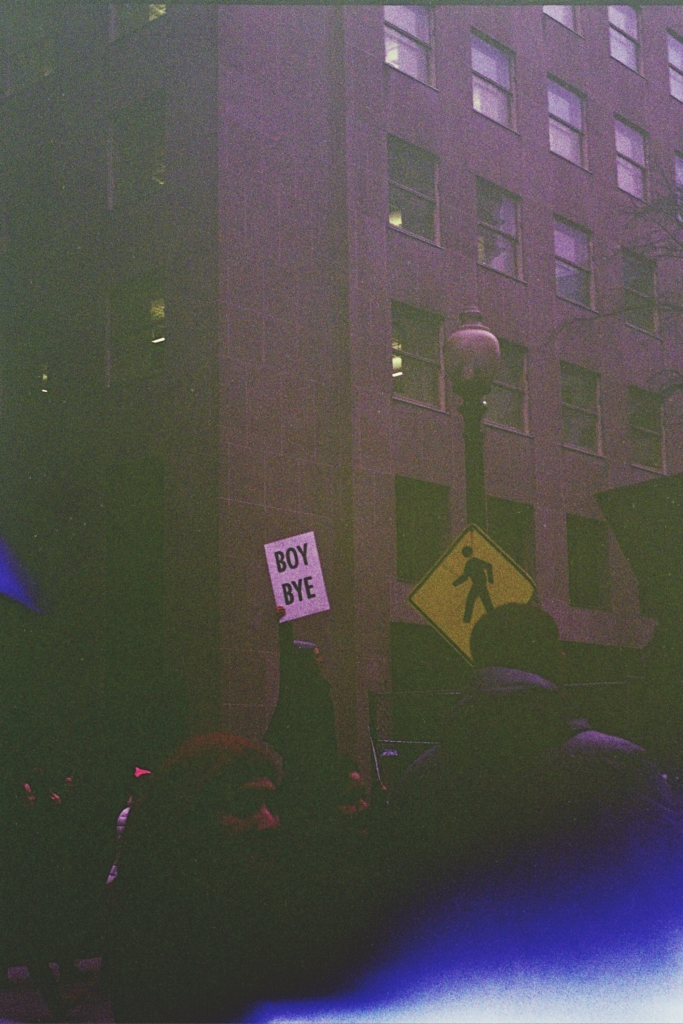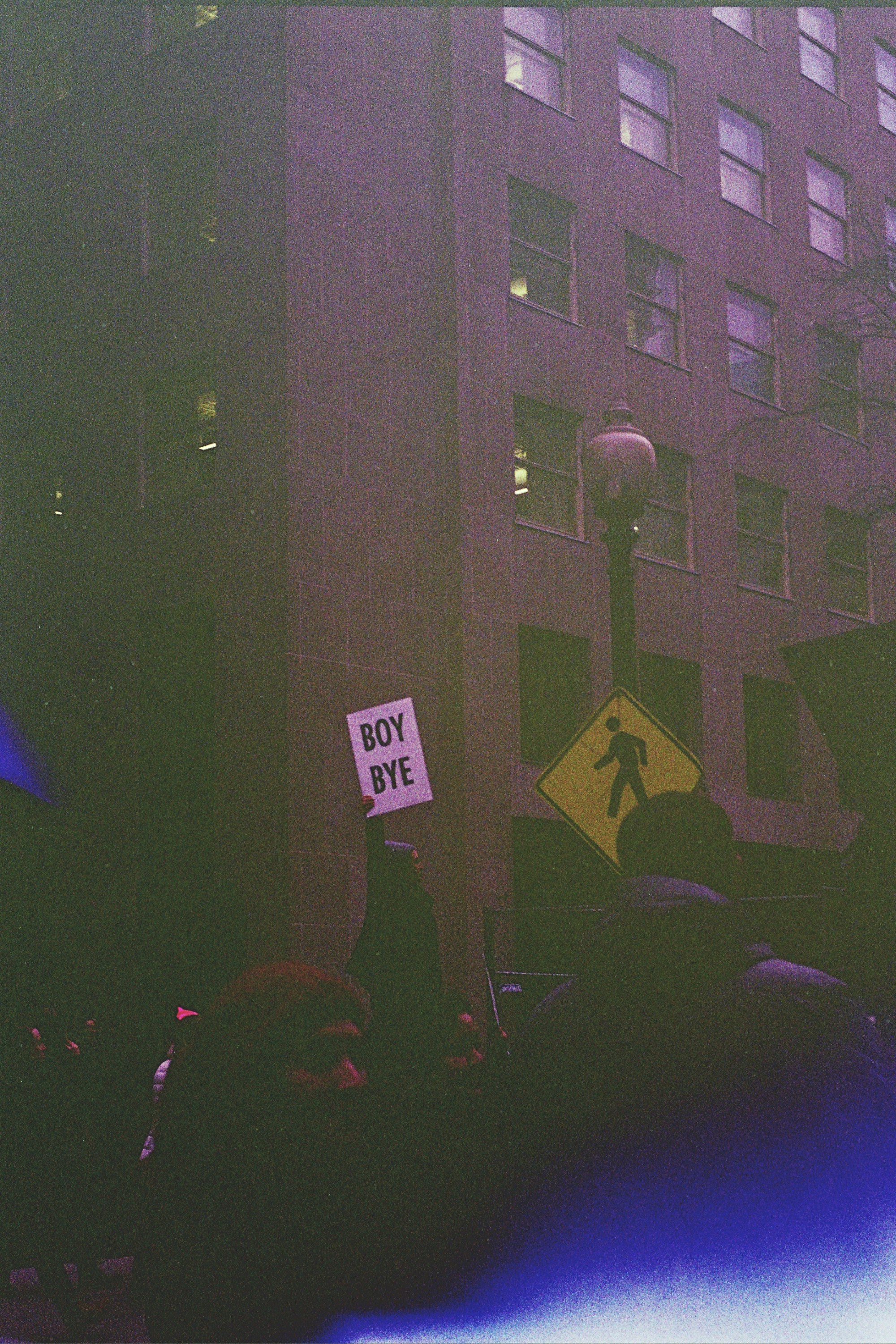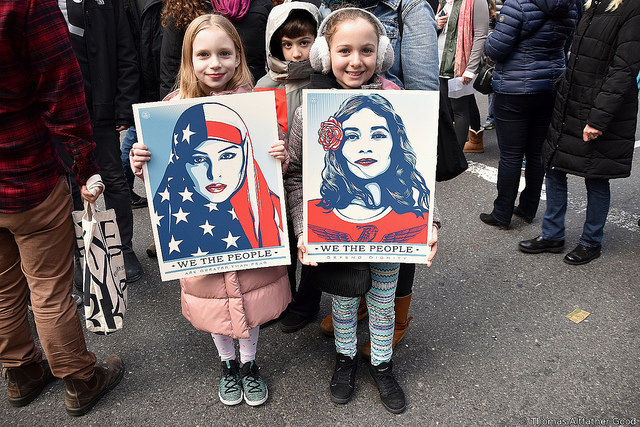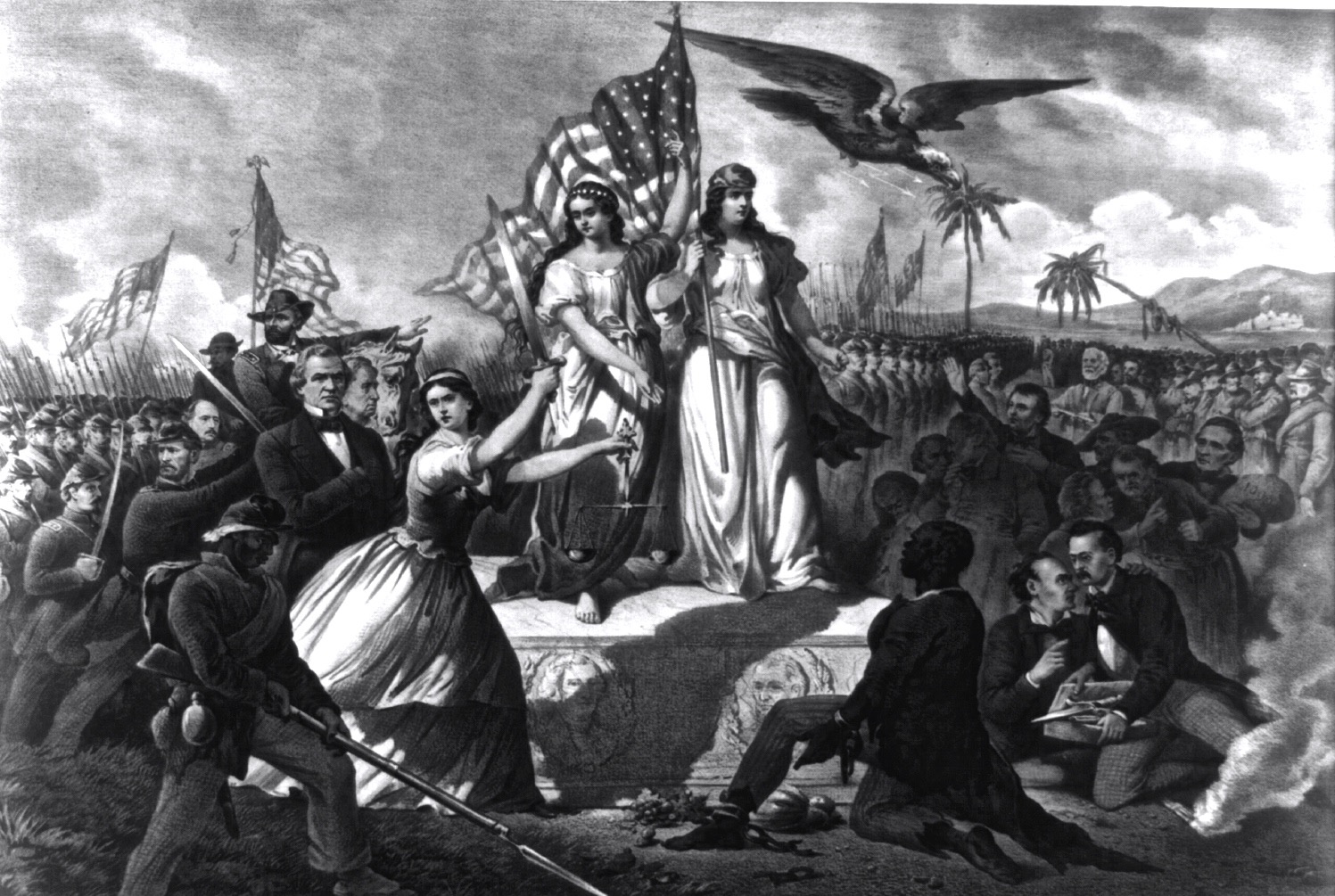First 100 Days: March of the Millennials and Grandmas
By Candy Schulman
Editor’s note: Trump’s inauguration initiated a series of public demonstrations that have continued throughout his first 100 days—including, challenging his refusal to release his taxes, in support of science and the environment, in defiance of his bigoted attempts to limit immigration and, as this essay reminds us, to make clear the power of women inspired to action by racism, misogyny, xenophobia, Islamophobia and injustice.
“Does this bring you back to your protesting days of the sixties?” my 22-year-old daughter asked me.
We were gathered with a group of writers in my friend’s apartment to assemble for the Women’s March the day after the inauguration, a short walk from our larger group’s meeting place. Even more importantly, she had two bathrooms where we could eliminate our bladders one last time before chanting, “This is what democracy looks like!”
“I never thought I’d be marching again,” a friend remarked after her final bathroom run. She was a grandmother, her thoughts reflecting signs we’d later see: I CAN’T BELIEVE I HAVE TO PROTEST THIS CRAP.
My daughter’s friends gave our posse diversity. I was thrilled to share this event with her, the way we’d voted last November, posting a Facebook photo saying, “We’re voting for the first woman president of the U.S.!”
Now my daughter wanted to know if today was like the past.
“Yes,” I told her, “but the drugs are different.”
My comrades discussed how much Xanax they’d ingested. I tended to reduce anxiety through meditation and swimming laps. Today, I wanted to fully feel the vibrations of sharing my daughter’s first protest march.
She wasn’t sure how many friends would come until the last minute, texting her social circle.
My host had sent out official invitations and instructions for weeks, and we’d RSVP’d to meet at her place as though responding to a wedding invitation. She snapped a photo before we left: three generations ranging from 14 to she-who-has-never-revealed-her-age. We dressed according to assorted maladies and hormonal spikes. A mix of original knees and replacements, we were a rowdy arthritic bunch: eager, hopeful, filling our pockets with tissues in case we found ourselves someplace without toilet paper.
It was unseasonably warm, temperatures approaching 50. A cool breeze whipped up. Noticing my daughter’s friend in a gray turtleneck and thin hat, I refrained from saying, “Are you dressed warmly enough?” I didn’t want to sound like her mother. Besides, she was from Maine.
Arriving at our designated starting corner, we found peaceful chaos. Crowds had grown so thick, we were gridlocked on East 48th Street. Occasionally the crowd roared, as if we were starting to move, but it was the kind of cheer you’d see at a baseball game when the stands erupt in an impromptu wave.
My daughter and her friends posed for a selfie. They looked so innocent and fresh, yet I worried that the rights they’d always expected might now be eroding. And I realized that those rights would mean much more to them once they had to fight for them.
A friend photographed the two of us, holding the sign she had crafted: WE HAVE TO START TALKING ABOUT THE ELEPHANT IN THE WOMB.
“Look at that adorable little girl,” my daughter said, pointing to a three-year-old on her father’s shoulders, holding a sign: NEXT POTUS.
Ninety minutes passed and we still hadn’t moved. “We’re going to push ahead,” my daughter said with the impatience of youth. “Do you want to come or stay?”
I wanted to march with her, but I was supposed to remain with my group. The organizers urged us to follow the rules for crowd control. I was no longer that sixties antiwar protestor, unafraid to be tear gassed, bailing friends out of jail. I’d turned into an adherer of the rules, a college writing professor who taught students to abide by attending classes and meeting assignment deadlines.
I told my daughter to go and kissed her cheek, hiding my disappointment.
An hour later we were still stuck in place. I worried about my daughter being trampled if the crowd grew impatient. Life without Xanax.
“Let’s reverse direction,” my group suggested.
That’s when we splintered into three subgroups. And I ended up alone. I began to feel claustrophobic the way I do in airplanes. I pushed my way through throngs of shoulder-to-shoulder people, all remarkably calm, waiting their turn. All 400,000 of us. The mall in D.C. is spacious. New York streets are narrow and dark.
“I’m having a panic attack,” I explained, forcing my way through bodies, signs and babies. When I reached Grand Central, thousands were spewing from subways and trains, and I went the opposite direction, downtown toward home.
Landing in Union Square in the sunshine, I felt my blood pressure lower. I ended up sharing the march with my daughter the way Millennials communicate all the time:
“We reversed direction and found our way to the march,” she texted. “We’re on Fifth Avenue!”
“Store employees keep waving at us!”
“I think I just saw Senator Schumer!”
She kept the texts and photos coming. This wasn’t how I’d expected to share my daughter’s first protest march, but technology allowed us to do it together after all.
That night we cooked lasagna, craving comfort food. We formed a group message, sharing photos of protest messages from one edge of our country to the other. One of our favorites: NOW YOU’VE PISSED OFF GRANDMA. That was how I felt, a bit old to be protesting this crap anymore, but doing my part as much as I could. I was passing the protest torch onto my daughter, but I’d always be there to cheer her on.
Candy Schulman is an award-winning essayist who has published personal essays and political Op-eds in The New York Times, The Washington Post, The Chicago Tribune, New York Magazine, Salon, and elsewhere. She is a creative writing professor at The New School. As an anti-war protestor at Ohio State University in 1970, she published an essay about the four students who were killed at Kent State, illuminating how peaceful student protests were combatted with tear gas and guns, whereas post-football game drunken brawls were overlooked by police.
Photo credit: Thomas Altfather Good via a Creative Commons license.




